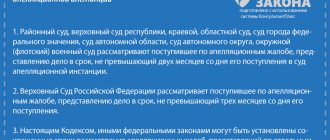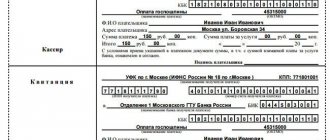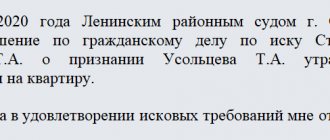A supervisory appeal is a full-fledged opportunity to appeal a court decision.
Such civil right is granted to every citizen who is confident in the unlawfulness of the decision of the judicial authority that has entered into force.
This is the last chance to change the court's decision.
The Presidium of the Supreme Court considers the supervisory appeal. If an application is rejected, the decision can only be appealed to international courts.
What do you need to know to file a supervisory complaint?
By filing this complaint, you can fully express your disagreement with the decision of the lower court.
Only the Supreme Court can overturn any previously made decision, even if the defendant is already serving his sentence or has paid the imposed fines.
If a civilian succeeds in obtaining justice after filing a supervisory complaint, then the previously made decisions will be annulled, and the damage incurred will be compensated to the convicted person.
Filing such complaints requires complete confidence that you are right. This can be especially effective when new evidence or circumstances in the case emerge.
The Supreme Court may satisfy the supervisory appeal either in full or in part. It is important to understand that if an application submitted to a higher authority has dubious arguments, then the case will not be considered.
The Supreme Court accepts only solid arguments based on current legislation.
Previously, rules were established according to which a supervisory complaint could not be accepted for consideration due to the expiration of the deadline for filing it.
However, the latest amendments to the Procedural Code of the Russian Federation have abolished any deadlines for filing this complaint.
The main difference between a supervisory complaint and an appeal is that the latter can be filed only within ten days from the date of approval of the court decision, and a complaint can be filed at any time, regardless of the timing and fact of serving the sentence.
Attached documents
The supervisory appeal must be accompanied by copies of decisions previously taken in previous instances, certified by the relevant judicial authorities.
A scanned image of each document sent via the Internet is certified with a simple or enhanced qualified electronic signature in accordance with the Procedure approved by Order of the Chairman of the RF Armed Forces dated November 29, 2016 No. 46-P.
In the absence of the necessary attachments, the supervisory complaint is subject to return without consideration on the merits within 10 days from the date of its submission (clause 2 of Article 412.4 of the Code of Criminal Procedure of the Russian Federation).
The legislative framework
The possibility of appealing against already adopted court decisions by filing this type of complaint is determined in Article No. 379 of the Criminal Procedure Code of the Russian Federation .
This part of the legislative document contains a list of reasons, based on which the Supreme Court can completely overturn decisions made by lower courts.
These are:
- Violation of the Criminal Procedure Code;
- Incorrect interpretation of the legislative document on which the court relied when making its decision;
- Unfair decision;
- In fact, the circumstances differ from those set out in the verdict passed by the lower court.
Also, there is a definition of the discrepancy between the sentence and the facts that were presented in the case.
These are:
- Conclusions made by the court that are not supported by the evidence base that was presented during the trial;
- During the sentencing process, circumstances that could influence the final decision were not taken into account;
- If there was conflicting evidence in the case materials , and the court decision was made only on the basis of one of its parts, without explaining its choice;
- The legality of the decision is questionable , since the verdict contains contradictory judicial conclusions.
If, after the verdict is passed, a violation of current regulatory and legal documents is discovered, the supervisory complaint will be satisfied.
This especially applies to situations where, during the proceedings, one participant was limited in his rights under the Criminal Procedure Code or completely deprived of them.
The main violations are specified in the current legislation.
These are:
- The presence of an illegal composition of the court when passing a sentence;
- Continuation of the trial, if there are full grounds for closing the case;
- The accused was not present during the consideration of the case materials, and the verdict was passed without his participation in the hearing.
A complete list of violations is given in Article No. 381 of the Criminal Law Code of the Russian Federation.
In addition, a complete list of grounds for changing or canceling a decision of a lower court is defined in the second and third parts of Article No. 409 of the Code of Criminal Procedure of the Russian Federation.
Grounds for cancellation of decisions
A supervisory complaint can be written if the norms of substantive or procedural law are violated. What does this mean? Violation of substantive legal norms occurs in cases where the court:
- The law that should have been used to make a fair decision was not applied.
- A reference was made to a rule that did not correspond to the nature of the case. In other words, when formulating an opinion, the court was based on a law that was not related to the essence of the dispute or contradicted the Constitution and other sectoral acts. The applicable law may also not have been in force at the time of the proceedings.
- The norm was misinterpreted. This means that the court misunderstood the provisions of the law.
Violation of procedural norms may serve as grounds for cancellation of an act if it could or has resulted in an incorrect resolution of the dispute. The list of such cases is given in Art. 364, parts 2 of the Code of Civil Procedure.
Who can file a supervisory complaint?
An appeal against a court decision in a civil case may be filed by the following categories of citizens:
- Persons who participated in previous trials in the specified case;
- Third parties whose powers and interests are affected by the decision;
- The prosecutor (if he took part in previous meetings), the Prosecutor General, or their deputies;
- Government bodies in order to defend rights in accordance with current regulatory documents.
When filing a supervisory appeal by third parties, it is required to indicate exactly which rights were affected by the verdict.
How is it served?
Appealing a court decision to a higher authority has some features, which require compliance with a certain algorithm of actions when filing papers.
It is recommended to follow the following step-by-step instructions:
- Draw up a supervisory complaint;
- Submit it to the Presidium of the Supreme Court of the Russian Federation via the postal service. This government agency has the right to review decisions of lower courts, correct, or cancel decisions that have already entered into force. It is important to consider that the document is submitted only by a certain list of persons;
- A supervisory appeal can only be filed against a court decision that has already acquired legal force;
- You are required to pay a state fee;
- Wait for the Supreme Court's decision.
Appealing a court decision to a higher authority has some features, which require compliance with a certain algorithm of actions when filing papers.
Where should I contact?
When challenging an act (including cassation) of the OS, if it was not the object of supervisory or cassation consideration in the Supreme Court, orders, rulings, decisions of magistrates and district bodies, the complaint is sent to the Presidium of the OS. A claim may also be made against the latter's decision. In this case, if the act was not considered by the Supreme Court of Cassation, the application is sent to the collegium of the Supreme Court. Complaints are also addressed to her if appeals to the Presidium of the regional court are left unsatisfied. When challenging acts of the Supreme Court, the Cassation Board of the Supreme Court, decisions of the Supreme Court made in cassation, the application is sent to the Presidium of the Supreme Court.
Review period
The time frame within which the application must be considered at a higher judicial institution is clearly determined by the current legislation.
Information on this issue is given in the table below.
| Without requesting materials on the case | The review period is up to one month from the date of submission of documents to the court. |
| Sending a request to provide materials on the case | The application is considered within two months from the date of filing the application with the court. The period does not include the period spent on sending a request for the provision of materials on the case and delivering them to the court. |
If a supervisory complaint is filed by a citizen who is serving a sentence, then delivery of the document to the authority may take a fairly long period of time. Such citizens are advised to file an appeal through a representative.
The final decision of the Supreme Court becomes valid after full consideration of the application and announcement of the decision.
The result and the supervisory complaint itself are necessarily filed with the applicant’s general case.
Time to contact
In Art. 376, part 2 of the Code of Civil Procedure establishes a period during which a supervisory complaint can be filed. Some authors consider the deadline for filing an application to be insufficient to realize the rights of citizens. Thus, the law sets a year for challenging the issued act. Questions in practice arise due to the fact that the period of consideration at different stages exceeds the specified period. When making sole determinations, the date of receipt of the claim must be indicated in order to correctly calculate the time for challenging.
What cases are being considered?
The highest court hears criminal, civil and administrative cases. Most citizens who received a negative decision in a local court do not file a supervisory complaint with the Supreme Court.
However, if there is significant evidence and full confidence in the illegality of the decision, you can safely file an appeal.
Before submitting documents, you must understand that the review process will begin only after receiving permission from the Deputy Presidium of the Supervisory Board and the Chairman of the Court.
Quite often, before submitting a supervisory appeal to the Supreme Court, all previously passed sentences that were approved before filing an appeal are checked.
If errors are discovered on the part of the court, the decision will not be canceled immediately, but this will help to significantly reduce the time required for consideration of the application by several months.
In a criminal case
The most convenient way to appeal a court decision is to send it by registered mail with acknowledgment of receipt. This is required so that the citizen knows exactly when his documents will be accepted for consideration.
If the applicant is in places of restriction or deprivation of liberty, then the supervisory complaint is filed through the administration of this institution. The appeal must necessarily contain the signature of the citizen who filed it.
When submitting a document by a lawyer, a warrant confirming the availability of the relevant education must be attached.
You can see an example of a supervisory complaint in a criminal case using the link below.
A sample supervisory complaint in a criminal case can be downloaded from this link
In an administrative case
An appeal to the Supreme Court of the Russian Federation in such cases should be carried out by filing a supervisory complaint with the Supreme Court of the region in which the applicant lives. The deadline for submitting a document is not limited by current regulatory documents.
A supervisory complaint of this type is not subject to state duty.
The basis for drafting is a general sample of a supervisory complaint, which can be downloaded from the link below.
Sample of a supervisory complaint in an administrative case
Drawing up a supervisory complaint
For civil cases
Drawing up a supervisory complaint of this type of case is allowed by the applicant himself. However, a clear understanding of the legislative norms that are defined in the Civil Procedure Code of the Russian Federation is required.
A supervisory appeal in a civil case is the last opportunity to change or completely cancel a court decision that has entered into force.
For a sample, use the sample complaint to the Supreme Court (link), which at the end must contain the signature of the applicant. In addition, a state fee of three hundred rubles is charged for each application.
Peer review
After one of the judges makes a report, the persons who appeared at the hearing (participants, their representatives, other interested parties who filed a complaint, if their interests and rights are affected by the contested decision) can give explanations. In accordance with Art. 387 of the Code of Civil Procedure, significant violations of substantive or procedural norms act as grounds for changing or canceling adopted acts. As a result of the review, a determination is made. It may be one of the following:
- Leave the complaint unsatisfied, and the decisions of the first, second or supervisory authority unchanged.
- Cancel the act in part or in full and send the materials for revision.
- Cancel the court decision in part or in full, leave the appeal without consideration or terminate the proceedings.
- Change or cancel the decision and make a new one without sending materials for review. Such a determination is made if an error is identified in the interpretation or application of substantive rules.
The instructions sent by the higher court are binding on the court that will review the case. If the Presidium of the subject body refused to satisfy the claim, upon further appeal to the Supreme Court it will be necessary to again provide certified copies of the decisions. Re-issuance of documents is subject to a state fee.
Sample of a supervisory appeal to the Supreme Court
Proceedings in a higher court are carried out only after the case has been heard in local courts.
Before filing a supervisory appeal with the Supreme Court, you need to make sure that the document is filled out correctly. This is necessary so that the appeal is not rejected at the initial stages.
You can see an example of a supervisory complaint in the photo below.
Sample complaint to the Supreme Court
The top part of the application must contain the following data:
- Full name of the official and name of the government agency to which the appeal is being filed;
- Full name, date and place of birth of the applicant;
- Data on past court decisions;
- With the applicant’s current place of residence (contact details must be indicated).
The main body of the application must contain information about which court decision was made earlier, as well as information about attempts to appeal this decision before filing a supervisory appeal.
In addition, the body of the document must convey arguments confirming the applicant’s words, data on errors of the judicial authorities, etc.
These are:
- Circumstances and data that were not taken into account during the investigation and the previous decision;
- Evidence that was ignored by the court;
- The presence of questionable evidence on the basis of which the verdict was made;
- Other violations of the Criminal Procedure Code.
At the end of the supervisory complaint there must be a list of photocopies of documents that will be attached to the application.
These are:
- Photocopies of all court decisions that have entered into force that the applicant has;
- Photocopies of all papers submitted to appeal the court decision;
- Copies of other papers that may have a direct impact on the change, or complete cancellation of the previous resolution.
Compliance with the procedure for submitting documents, a correctly drawn up supervisory complaint and a complete package of attached papers significantly increase the chances of receiving a positive response to the case.
Since an appeal can be filed within an unlimited period of time, it is allowed to be submitted:
- While serving a sentence in prison;
- Immediately after the convicted person is released from arrest;
- Upon complete expungement of a criminal record, in order to receive compensation.









